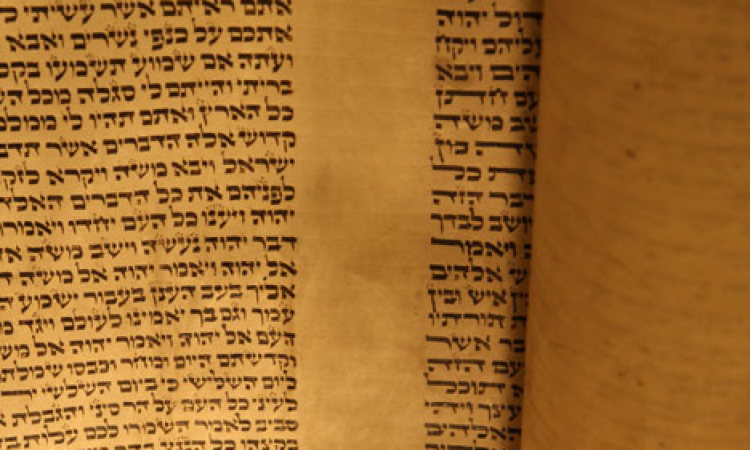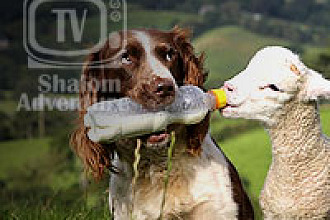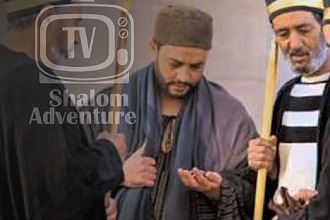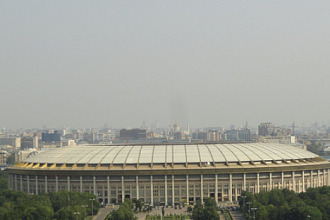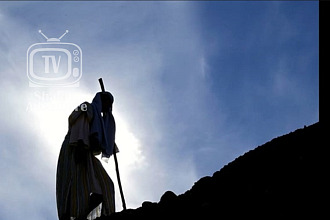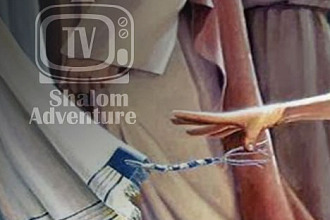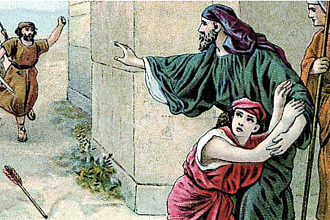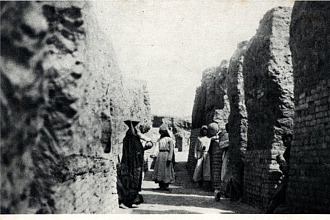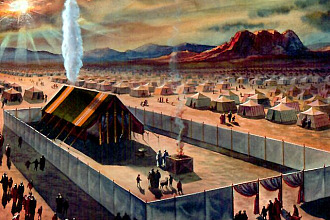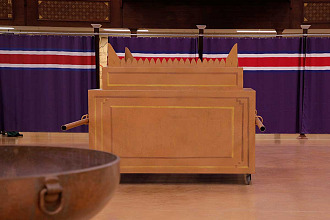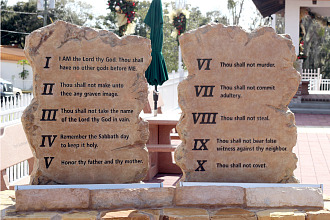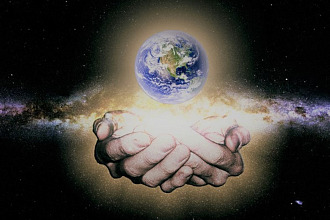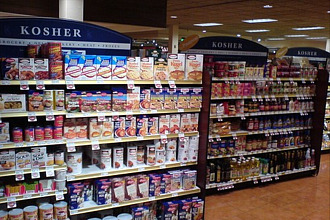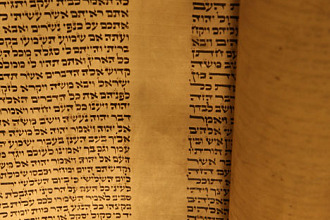Parasha for the Week: Beha'alotcha: Numbers 8:1 – 12:16
Haftarah: Zechariah 2:14 – 4:7
Besorat Yeshua: Mark 4:21 - 34
Overview
Aharon is taught the method for kindling the menorah. Moshe sanctifies the levi'im to work in the Mishkan. They replace the first-born, who were disqualified after sinning at the golden calf. The levi'im are commanded that after five years of training they are to serve in the Mishkan from ages 30 to 50; afterwards they are to engage in less strenuous work.One year after the Exodus from Egypt, G-d commands Moshe concerning the korban Pesach. Those ineligible for this offering request a remedy, and the mitzvah of Pesach Sheini, allowing a "second chance" to offer the korban Pesach one month later, is detailed.
Miraculous clouds that hover near the Mishkan signal when to travel and when to camp.
Two silver trumpets summon for announcements, travel plans, war, or festivals.
The order in which the tribes march is specified.
Moshe invites his father-in-law, Yitro, to join the Jewish People, but Yitro returns to Midian.
At the instigation of the mixed Egyptian multitude who joined the Jewish People in the Exodus some people complain about the manna. Moshe protests that he is unable to govern the nation alone. G-d tells him to select 70 elders to assist him, and informs him that the people will be given meat until they will be sickened by it.
Two candidates for the group of elders prophesy beyond their mandate, foretelling that Yehoshua instead of Moshe will bring the people to Canaan. Some protest, but Moshe is pleased that others have become prophets.
G-d sends an incessant supply of quail for those who complained that they lacked meat. A plague punishes those who complained.
Miriam makes a remark to Aharon against Moshe. G-d punishes Miriam with tzara'at (leprosy). Moshe prays for her, and the nation waits until she is cured before traveling.
"To Elevate the Menorah"
This week's Parsha, Beha'alotcha begins with G-d's instructions to Aaron concerning the lighting of the Menorah. But, instead of using the word "Lehadlik" which means to "kindle," the Torah uses the word "Beha'alotcha" which literally means to "elevate."
The golden menorah by itself is nothing (even though the solid gold is worth much in secular worldly economy). It is as it becomes an instrument of disseminating light that it is elevated, that it becomes worth something. We of ourselves are nothing (although we may be valuable in our profession on a secular worldly level) but as we allow God to disseminate the light of His love through us that we become elevated to the status of Children of the Most High God.
"Stealing Time"
The Torah states: "According to the word of the Almighty they shall encamp and according to the word of the Almighty they shall travel." (Numbers 9:23). When a person is in his usual place, it is relatively easy to keep higher standards of Torah observance. However, when a person travels, said the Chofetz Chaim, there are many tests that arise. When in a strange place, away from one's familiar environment, one is faced with new difficulties. Also, there is not the social pressure to maintain one's standards. A person needs to make a special effort to observe Torah values. This is hinted to in our verse: Whether at rest in one's home environment or traveling, all that you do should be "according to the word of the Almighty."
Rabbi Yaakov Kamenetzky was about to take his place at the end of a long line waiting to board a bus, when someone in front of the line who knew him called out, "Rebbe, you can come here in front of me!" "I'm not permitted to," replied Rav Yaakov. "It would be stealing." "I give you permission. I don't mind." "But what about everybody else behind you?" said the Rosh Hayeshiva. "I would be stealing their time and choice of seat by moving them back one. Who says they allow me to?" And Rav Yaakov took his place at the end of the line. (The Jewish Observer, November, 1985)
"Miriam's Gossip"
The Torah states: "Miriam and Aharon spoke against Moshe because of the Cushite woman whom he had married... they said, 'Has God spoken only with Moshe? Has he not spoken also with us?' And the Lord heard. But the man Moshe was very humble, more than all the men that were upon the face of the earth." (Numbers 12:1-3). Rabbi Yisroel Meir Kagan, wrote; The prohibition against speaking lashon hara (evil speaking) applies even when the person spoken against is very humble and does not mind if others speak against him. Even if you have done many favors for another person, it does not give you the right to speak against him. Miriam helped save Moshe's life when he was an infant, but was still punished for her loshon hora. The prohibition against loshon hora applies even if you do not publicize the loshon hora, but only relate it to one person, and that person does not repeat it to anyone else.
"Pray for Your Enemies"
The Torah states "Moshe cried unto the Lord, saying 'Please G-d, heal her (Miriam), I beseech you" (Numbers 12:13). Miriam just spoke against Moshe! And what is Moshe's response? He prays for her to be healed! Rabbi Levi ben Gershon, who lived 1288-1344 shares with us an illuminating insight. From here we learn that even if someone acts against you and is punished for his act, you should do all you can to assist him.
"Moshe was extremely humble, more so than any man on the face of the earth." (Nb 12:3)"
"Know What is Above"
A group of children had a contest to see who could climb to the top of a tall ladder. One after the other, the children climbed about half way, became frightened, and gave up. Only one boy managed to make it to the top. His grandfather asked him, "How did you accomplish what the others couldn't?" The boy answered, "The other children kept looking down as they climbed thus, realizing how high they were and became frightened. I continuously kept looking up and realized how low I was so I wanted to go higher and higher." "Know what is above you," says Rabbi Yehuda HaNasi. By "looking up" we will be encouraged and strive to go higher and higher spiritually, thus we will not come to sin."
"G-d Was Watching"
A wagon driver was taking a rabbi from one town to another. Along the way the driver decided to help himself to some bailed hay in a farm along the road. "Rabbi, if you notice anyone watching let me know immediately!" No sooner did the driver start gathering the hay, when the rabbi yelled out, "Someone's watching! Someone's watching!" The driver dropped the hay, ran back to the carriage and drove away as quickly as he could. After a while he said, "Rabbi, Are you sure someone was watching?" "Definitely!" replied the Rabbi. "G-d was watching!"
"Prepare Yourself to Meet Your G-d"
Rabbi Yaakov said, 'This world is like a lobby before the World-to-Come; prepare yourself in the lobby so that you may enter the banquet hall."
Haftarah: Zechariah 2:14 – 4:7
Parasha: In the text of the parasha the Lord commanded Aaron to atone the priests: "When you bring the Levites before the LORD, the Israelites shall lay their hands on the Levites, and Aaron shall present the Levites before the LORD as an elevation offering from the Israelites, that they may do the service of the LORD. The Levites shall lay their hands on the heads of the bulls, and he shall offer the one for a sin offering and the other for a burnt offering to the LORD, to make atonement for the Levites." (Num. 8:10-12).
Haftara: We have in this haftara a beautiful story about Joshua the High Priest and the Angel of the Lord. Last week we wrote about the Angel of the Lord, who is more than an angel, but who is the great Michael, the one who has the power to forgive the sins of Israel (Exodus 23:20). In our story the messenger came to give forgiveness to the High Priest Joshua. "he showed me the high priest Joshua standing before the angel of the LORD. Joshua was dressed with filthy clothes as he stood before the Angel. The Angel said to those who were standing before him, "Take off his filthy clothes." And to him He said, "See, I have taken your guilt away from you, and I will clothe you with festal apparel." And I said, "Let them put a clean turban on his head." So they put a clean turban on his head and clothed him with the apparel. If you will walk in my ways and keep my requirements, then you shall rule my house and have charge of my courts... Now listen, Joshua, high priest... I am going to bring my servant the Branch." (Zech. 3:3-5,7,8). This "branch" is a branch coming from the genealogy or "tree" of Jesse and it is called the "Branch of the Lord", the Messiah. (Isaiah 4:2).
Besorat Yeshua: Mark 4:21 - 34
Parasha: The parasha of this week is called Beha'alotcha, which refers to elevating the menorah by lighting it. "Aaron did so; he set up its lamps to give light in front of the lampstand, as the LORD had commanded Moses." (Numbers 8:3).
Besorah: In this text Yeshua give order about the menorah and said: "Is a lamp brought in to be put under the bushel basket, or under the bed, and not on the lampstand? For there is nothing hidden, except to be disclosed; nor is anything secret, except to come to light. Let anyone with ears to hear listen!" (Mark 4:21-23).
In the Besorah Yeshua give some parable about the kingdom of G-d. "The kingdom of God is as if someone would scatter seed on the ground, and would sleep and rise night and day, and the seed would sprout and grow, he does not know how. The earth produces of itself, first the stalk, then the head, then the full grain in the head. But when the grain is ripe, at once he goes in with his sickle, because the harvest has come." (Mark 4:26-29). When we spread the gospel, the seeds of the good news, the Holy Spirit works and allows it to grow night and day.
Then Yeshua gave another parable about the Kingdom of God, "With what can we compare the kingdom of God, or what parable will we use for it? It is like a mustard seed, which, when sown upon the ground, is the smallest of all the seeds on earth; yet when it is sown it grows up and becomes the greatest of all shrubs, and puts forth large branches, so that the birds of the air can make nests in its shade." (Mark 4:30-32). Even though the kingdom started small it become bigger by the work of the Holy Spirit.

